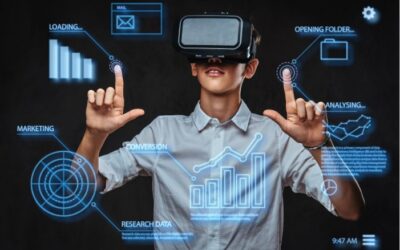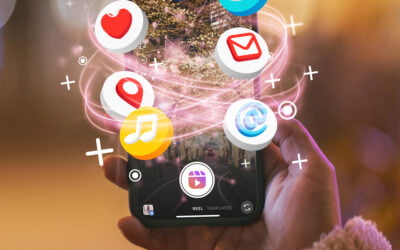As we step into 2025, the game-changer that continues to dominate discussions is the powerful duo of AI and automation in marketing industry. According to a recent survey, businesses leveraging AI in personalization have seen an average increase of 20% in customer satisfaction and a 15% boost in conversion rates.
In this playbook, we’ll not only delve into the basics but also uncover some hidden gems that are little-explored by the marketers. In the game of win and lose, this guide might help you create a win-win outcome.
So, buckle up; it’s time to master the art of outranking your competitors with the latest in AI and automation.
Understanding AI & Automation Meaning
AI (Artificial Intelligence): Imagine a super-smart computer that can learn and solve problems like a human, but way faster. It can analyze tons of data, see patterns we miss, and make predictions or decisions based on what it finds. AI powers cool things like self-driving cars, medical diagnosis, and even writing creative content!
Automation: Think of repetitive tasks you do at work or home, like scheduling emails or watering plants. Automation involves using tools to do these tasks for you, automatically, freeing up your time for more important things.
AI and Automation together: That’s when things get really exciting! AI can tell the automation tools what to do based on what it learns, making them smarter and more efficient. However, AI & automation in marketing has brought much positive transformation to make marketing easy and seamless.
Example, Imagine emails writing themselves based on your customer’s needs, or robots stocking shelves based on demand forecasts. Pretty cool, right?
So, in short, AI is the brain that learns and analyzes, while automation is the muscle that gets things done – and together, they can change the way we live and work!
What is the use of AI in Marketing?
AI in marketing industry has several evolving changes that has transformed the workings of marketers. As considering the use, below points are also AI in marketing examples.
Hyper-personalization: AI analyzes customer data from past interactions, interests, and demographics to tailor messages, content, and recommendations in real-time. Imagine your online store suggesting shirts a customer might actually like, based on their browsing history, instead of generic recommendations.
Automation of repetitive tasks: AI takes over time-consuming tasks like scheduling social media posts, sending personalized emails, and generating reports. This frees up marketers for more strategic thinking and creative work.
Improved targeting and ad campaigns: AI helps identify your ideal audience across different platforms and channels, ensuring your ads reach the right people at the right time. It can also optimize ad spending for better ROI.
Enhanced customer experience: AI chatbots provide 24/7 customer support, answer questions, and resolve issues. They can also personalize interactions, making customers feel valued and understood.
Content creation and optimization: AI-powered tools can help generate different content formats like blog posts, product descriptions, and social media captions. It can also analyze content performance and suggest improvements for better engagement.
Predictive analytics: AI can analyze trends and customer behavior to predict future actions and purchase decisions. This helps marketers anticipate customer needs and personalize their approach accordingly.
Market research and competitor analysis: AI can gather and analyze vast amounts of data to understand market trends, identify competitor strategies, and uncover new opportunities.
Fraud detection and risk management: AI can detect fraudulent activities like fake accounts and unauthorized transactions, protecting businesses from financial losses.
What is the use of Automation in Marketing?
Automation in marketing is like having a tireless, super-efficient assistant who takes care of all the repetitive, time-consuming tasks. It frees up your time and resources to focus on the bigger picture, the creative spark, and the strategic decisions that truly drive results.
Additionally, the benefits of using artificial intelligence are not only advantaging marketing industry but also in business process automation in different ways. Here are some of the key ways automation benefits marketing:
1. Increased Efficiency and Productivity
Imagine never having to manually send another email or schedule another social media post. Automation handles these tasks, allowing you to work on more strategic initiatives.
Repetitive tasks like lead nurturing, data entry, and report generation can be automated, saving you hours of work and reducing human error.
2. Improved Personalization and Customer Experience
Automation allows you to tailor your marketing messages and content to individual customers based on their interests, behavior, and purchase history.
Chatbots and automated email sequences can provide personalized customer support 24/7, while automated product recommendations can improve the shopping experience.
3. Better Targeting and Campaign Optimization
Automation can analyze data and identify your ideal target audience across different channels, ensuring your campaigns reach the right people at the right time.
A/B testing and performance tracking can be automated, allowing you to quickly optimize your campaigns for better results.
4. Cost Savings and Increased ROI
By automating tasks and reducing manual work, you can save time and money on manpower and other resources.
Efficiently targeted campaigns and personalized experiences lead to higher conversion rates and increased ROI.
5. Improved Data Insights and Decision Making
Automation can collect and analyze massive amounts of data about your customers and campaigns, providing valuable insights into their behavior and preferences.
This data can be used to make informed decisions about your marketing strategy, product development, and customer service.
What is the Role of AI in Marketing Automation?
Imagine a superhero sidekick for your marketing team, one that can crunch data, craft personalized messages, and predict customer behavior – that’s AI in marketing! Its role is to amplify your marketing efforts, making them more efficient, relevant, and impactful. Here’s a glimpse of what AI does:
1. Supercharged Personalization
Tailored content and offers: AI analyzes customer data to understand their preferences and buying habits. This allows you to deliver targeted messages, product recommendations, and even website experiences that resonate with each individual.
Real-time engagement: AI chatbots can have genuine conversations with customers, answering questions and offering support 24/7. They can even personalize their responses based on the customer’s history and context.
2. Precision Targeting
Finding the right audience: AI analyzes vast amounts of data to identify your ideal customers across different channels. This means your marketing efforts reach the people most likely to be interested, reducing wasted ad spend and maximizing ROI.
Optimizing campaigns on the fly: AI continuously monitors campaign performance and makes adjustments in real-time. This ensures your ads are always showing to the right people at the right time, leading to better conversion rates.
3. Unlocking the Power of Data
Predicting customer behavior: AI analyzes customer data to identify patterns and predict future actions. This allows you to anticipate customer needs and personalize your marketing approach accordingly.
Making data-driven decisions: AI provides insights that go beyond traditional metrics. You can understand what truly drives customer engagement and make informed decisions about your marketing strategy, product development, and customer service.
7 Tactics of AI & Automation in Marketing to Outreach your Competitors
1. AI-Powered Personalization: Crafting Tailored Experiences
Personalization is not a new concept, but with AI, it’s reaching new heights. Instead of just addressing customers by their first name, AI can analyze vast amounts of data to predict their preferences, behaviors, and even anticipate future needs. Tailoring your marketing messages with precision can set you apart from competitors who may still be stuck in a one-size-fits-all approach.
2. Next-Gen Chatbots: Elevating Customer Engagement
While many blogs talk about chatbots, let’s take it a step further. An insight about companies adopting advanced chatbot technology report a 35% reduction in customer service costs and a 50% increase in customer engagement.
The next generation of chatbots isn’t just about answering FAQs. They’re becoming conversational partners, understanding context, and providing personalized solutions. Integrate these intelligent bots into your customer journey, and watch your engagement soar.
3. The Rise of Predictive Analytics: Anticipate, Don’t React
Predictive analytics is not merely about historical data; it’s about foreseeing the future. By harnessing AI, marketers can now predict trends, customer behaviors, and market shifts. Be the trendsetter in your industry by utilizing predictive analytics to anticipate customer needs, rather than simply reacting to them.
4. Interactive Content: Engaging Beyond the Click
In the generation of content creation, AI is turning static content into dynamic, interactive experiences. Imagine personalized quizzes, 360-degree videos, and augmented reality elements seamlessly integrated into your marketing campaigns. By providing interactive content experiences, you’ll capture and hold your audience’s attention in ways your competitors might not have explored yet.
5. Beyond SEO: Voice Search Optimization
SEO is a staple, but voice search is the next frontier. With smart speakers and voice-activated devices on the rise, optimizing contents for voice searches is non-negotiable. Think beyond keywords and consider how people naturally speak to their devices. Be the brand that answers the questions your competitors haven’t even thought about.
6. AI-Enhanced Creativity: The Secret Ingredient
Creativity meets AI, and the result is nothing short of magic. AI tools are not here to replace creativity but to enhance it. From generating compelling copy to designing eye-catching visuals, AI is a creative powerhouse. Use it to fuel your imagination and produce marketing materials that stand out in a crowded digital world.
7. Embracing Blockchain: Transparency & Trust
While blockchain might seem like an odd fit, it’s a game-changer for marketing. Incorporating with blockchain solution ensures transparency in data handling, building trust with your audience. Showcasing your commitment to secure and ethical practices can be a unique selling point that sets you apart in a market cluttered with vague promises.
Is Blockchain Right for your Business? (6 Questions to Ask yourself Before you Invest)
Conclusion
As you gear up for a successful marketing journey in 2025, remember that staying ahead requires a willingness to explore the uncharted. Embrace AI and automation in marketing with these 7 tactics, and you’ll not only keep pace but set the pace for your competitors. And to empower your marketing Success, opting for an AI & Automation company is the smartest move any marketer can make for rapid growth. Therefore, here’s to a year of innovation, engagement, and unrivaled success!
Frequently Asked Questions (FAQs)
What is AI marketing automation?
AI marketing automation uses artificial intelligence to streamline, optimize, and personalize marketing tasks, such as customer segmentation, content creation, and campaign management.
How is AI used in marketing?
AI is used in marketing to analyze data, predict customer behavior, personalize content, automate campaigns, and enhance decision-making.
How is automation used in marketing?
Automation in marketing handles repetitive tasks like email scheduling, social media posting, and lead nurturing to improve efficiency and consistency.







